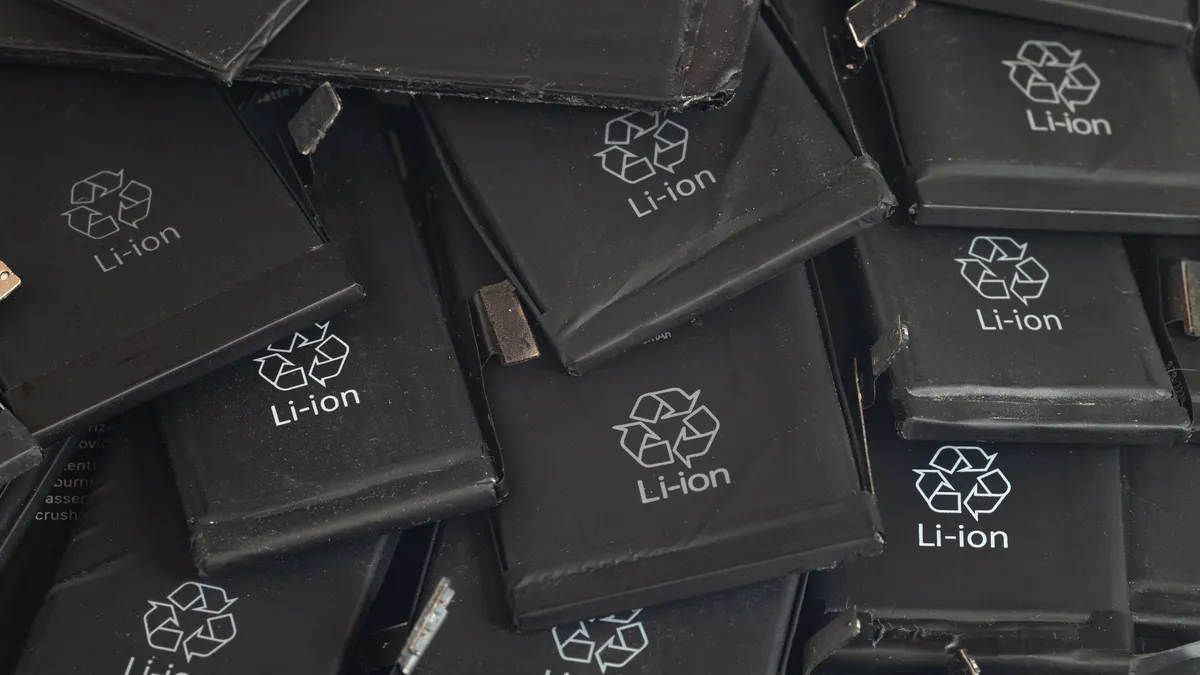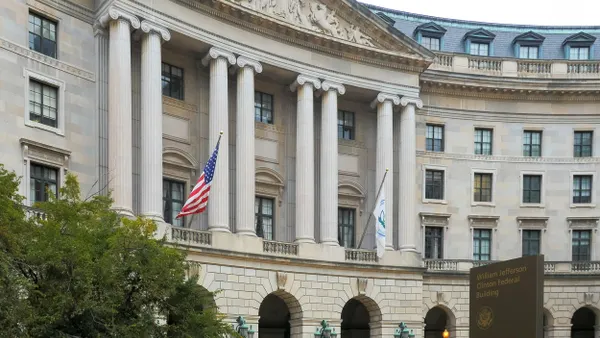Dive Brief:
- A bill creating an extended producer responsibility program for batteries is headed to Illinois Gov. J.B. Pritzker’s desk for signature. The bill applies to small-to-medium-sized portable batteries, including lithium-ion and lithium metal batteries.
- The Illinois Portable Battery Stewardship Act calls for those who sell or distribute certain types of batteries to join a stewardship organization designed to fund battery management programs. The program would be required to make collection points available throughout the state, launch public education campaigns and keep track of the program’s effectiveness.
- The stewardship organization would need to pay the Illinois Environmental Protection Agency $100,000 a year for a program that improves battery collection, transportation, recycling and safe disposal, according to the bill. The program would take effect on Jan. 1, 2026, and collection sites would be established by the end of 2028.
Dive Insight:
Illinois’ bill illustrates how lawmakers at the state and federal level have increased their focus on battery and electronics recycling in recent years. At the state level, new stewardship programs, such as the 2023 bill passed in Washington state, gained support as a way to curb recycling and waste facility fires, particularly those caused by lithium-ion batteries.
State Sen. David Koehler, the bill’s sponsor, said in a statement that the bill was shaped based on safety concerns raised by the waste and recycling industry, along with the battery industry and local governments. The state legislature approved the bill May 24.
Meanwhile, at the federal level, agencies such as the U.S. Department of Energy have committed millions of dollars in funding to support battery recycling innovation projects as a way to kickstart efforts to shore up a domestic supply of critical materials.
Some waste industry groups have not always supported certain types of EPR bills, particularly EPR for packaging. Minnesota passed one this year with mixed feelings from recyclers, while New York lawmakers failed to pass one in due in part to competing stakeholder interests.
However, Illinois’ battery EPR bill received widespread support from haulers and recyclers, including GFL Environmental, Homewood Disposal Service, LRS, Republic Services, Waste Connections and WM, as well as the National Waste & Recycling Association’s state chapter, according to a news release. The Product Stewardship Institute, Illinois Environmental Council, Illinois Product Stewardship Council and Illinois Recycling Association & Foundation also supported the bill, along with a list of local government and environmental agencies.
“The passage of the Illinois Portable Battery Stewardship Act is a step in the right direction for our ongoing efforts to enhance recycling and waste management practices,” said Michael Hoffman, NWRA’s new president and CEO.
NWRA says the bill “aligns perfectly with its mission to advance the safe and efficient recycling of hard-to-handle materials. This legislation will not only help reduce environmental pollution caused by improperly disposed batteries but also conserve valuable resources through effective recycling.”
“As portable batteries become more ubiquitous in our lives, it’s imperative that states take proactive measures to get ahead of this issue. Lithium-ion batteries that are improperly managed can cause fires, leading to service delays and disruptions, increased costs for consumers and harm to facilities and workers,” said George Kerchner, executive director of The Rechargeable Battery Association, in a statement.
The bill comes during a busy year so far for battery EPR in the U.S. In January, New Jersey enacted an EPR law for electric and hybrid vehicle batteries, becoming the first state to establish such a program. Vermont expanded its 2014 EPR program for household batteries — the first in the country — by approving a bill in May adding rechargeable batteries, removable batteries and some medium-format types.
In 2021, Washington, D.C., enacted the first EPR law for rechargeable and primary batteries.
In 2022, California established its own EPR program for a range of single-use and rechargeable batteries and established a stakeholder advisory board. In 2023, Washington state enacted its own EPR for batteries law.
If Illinois’ bill is signed into law, House sponsor Rep. Sharon Chung hopes it will serve as a “powerful example” that spurs other states to follow.












